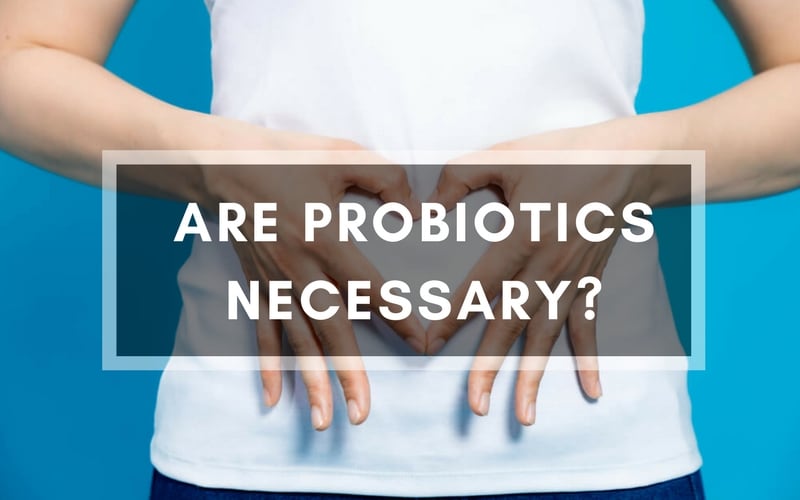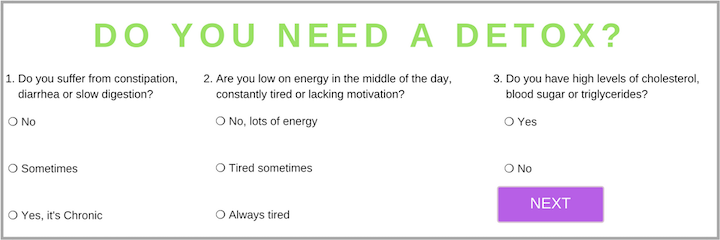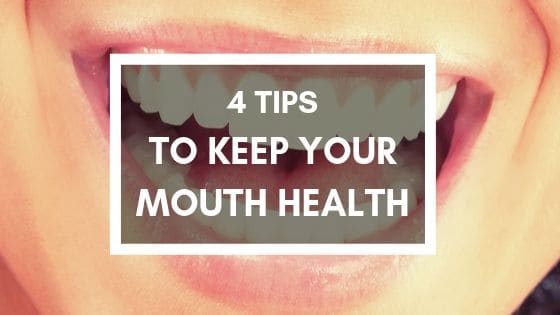
There are 3 main reasons why you should take probiotics:
1- If you have taken antibiotics.
2- If you are struggling with digestive issues or mood disorders.
3- If you want to maintain a healthy flora.
Antibiotics are great to get rid of a bacterial infection, but they also have the ability to disrupt the balance of your gut. This is why you should take probiotic supplements during and after the course of antibiotics.
Keeping your gut flora balanced is very important for good health. The bacteria living in your intestines interact with your body in many ways.
They are involved with your immune system in the production of neurotransmitter molecules, which has an influence on your mood.
Your healthy microbes also protect your intestines from unfriendly bacteria, yeast and parasitic damage…
When the balance in your gut is disrupted, these pathogens can injure the walls of your intestines and cause intestinal permeability. This is a condition called leaky gut syndrome, in which undigested food particles and pathogens can get into the bloodstream via small holes on the intestinal wall.
This can cause allergies, autoimmune diseases, and inflammation.
Knowing that, keeping your flora healthy and balanced is a good strategy to promote health and to avoid illnesses. This is why consuming probiotic supplements is necessary…
Why are probiotics necessary
Humans used to be connected to the Earth, eating unwashed fruits and vegetables, and drinking from rivers. We ingested bacteria just like other animals. Back in those days, we did not need to take probiotic supplements!
But times have changed.
Our water is now treated with chlorine to kill microbes.
Soft drinks contain phosphoric acid, which kills our gut bacteria.
We drink coffee and tea every day, which is also very rough on bacteria.
And let’s not forget the alcohol we consume in large quantity! Alcohol is used to sterilize surgical instruments in hospitals because it kills bacteria. Imagine what it does to your microbiome!
Our modern agriculture’s use of pesticides and herbicides also has a huge impact on our microbial health. These toxic chemicals are designed to kill cells, so the residues left on our food can also damage our own cells.
The factory-farmed animals are treated with antibiotics to fight all the infections they suffer from. In the last decades, eating those animals has created a huge problem: antibiotic-resistant bugs.
While your friendly bacteria are being assaulted every day by the stuff you consume, unfriendly bacteria, yeast and other microbes multiply in your gut, damaging your intestinal wall and making their way into the rest of your body. This is why we now have a leaky gut syndrome crisis, and other inflammatory conditions.
So, if you consume these products I have mentioned above on a regular basis, or if you have recently taken antibiotics, you should definitely consider taking a probiotic supplement to avoid a yeast overgrowth or digestive problems such as bloating, gassiness, constipation and diarrhea.
Is your poop normal? Take the test
[omdetox_newsletter]
How to choose probiotic supplements
Probiotic supplements are made of a blend of beneficial organisms and nutrients to support their growth (prebiotics). These nutrients are most commonly fructo-oligosaccharides, or F.O.S., a fibre that naturally occurs in plants like onion, chicory, garlic, banana, asparagus, or artichoke. They are used as a filler to feed the bacteria in each capsule. This is why they are called prebiotics.
There are strains of bacteria that are particularly beneficial for the human gut, and some even appear to be better than others for certain conditions.
People suffering from Crohn’s disease and ulcerative colitis, two illnesses that involve chronic inflammation in the digestive tract, would benefit from taking Lactobacillus Plantarum and Lactobacillus Casei, because of their anti-inflammatory properties. However, they should purchase a brand that does not contain any F.O.S., because it could make their condition worse.
Women suffering from recurring urinary infections can prevent future infections by supplementing with Lactobacillus Acidophilus. This strain is also known to be efficient at rebalancing the gut flora after a course of antibiotics.
Traveler’s diarrhea may be prevented and treated with Saccharomyces Boulardii, a member of the yeast family. Every backpacker should have a bottle of these when traveling. Taking 1 capsule per day can prevent a lot of discomfort.
Here are the strains that you should look for in a probiotic supplement. They do not have to be all there, but the more strains you have, the better.
- Lactobacillus acidophilus
- Lactobacillus plantarum
- Lactobacillus salivarius
- Lactobacillus bulgaricus
- Lactobacillus casei
- Lactobacillus rhamnosus
- Bifidobacteria longum
- Bifidobacteria bifidum
- Bifidobacterium lactis
- Bifidobacterium infantis
To have a positive impact on your gut flora, a probiotic supplement should contain a good number of beneficial organisms. You should look for a brand that has at least 5 Billion bacteria per capsule. On the bottle, it will be shown as “CFU’s”, which means colony forming units.
If you suffer from serious digestive issues, you can take 100 Billion CFU’s per dose. So, if your probiotic supplement contains 50 Billion CFU’s, you should take at least 2 capsules per day.
Are probiotic foods good for you?
There is no doubt about it, probiotic-rich foods cannot harm you. However, they do not have an impact on your gut flora like probiotic supplements do.
Yogurt for example, is kind of a waste of time. Most brands are pasteurized so there are no living bacteria in it. And the cultured yogurt brands that are supposed to provide you with probiotics usually contain no more than a few million bacteria. So eating yogurt for probiotics is pointless, unless you eat a truckload of yogurt!
Yogurt also contains casein, industrial sugar, saturated fat, cholesterol and gelatin, which do not promote good health.
When should you take probiotics
Probiotic supplements are best absorbed when your stomach acid is at its lowest. That way, the beneficial bacteria will be able to pass through the stomach without dying, and make their way into the intestine.
When you take probiotics with a meal, the beneficial organisms are killed by the hydrochloric acid that is secreted to break down the food you eat. This is why it is best to take your supplement on an empty stomach at least 30 minutes before a meal, or just before bed when your stomach has emptied.
If you do not suffer from digestive problems, or have not taken antibiotics, you could still benefit from taking a brief course of probiotics. Since we regularly drink chlorinated water, coffee, alcohol and tea, and eat non-organic, processed and sprayed foods, it is wise to take probiotics several times per year, for at least a week or two.
On the other hand, if you have recently taken antibiotics, you should supplement with probiotics for at least one month. If you are planning on taking antibiotics, you should also take probiotic supplements during your treatment.
For freshness, keep your probiotics in the refrigerator or in a cool, dry place. Visit this page to see our recommended probiotic supplements.








